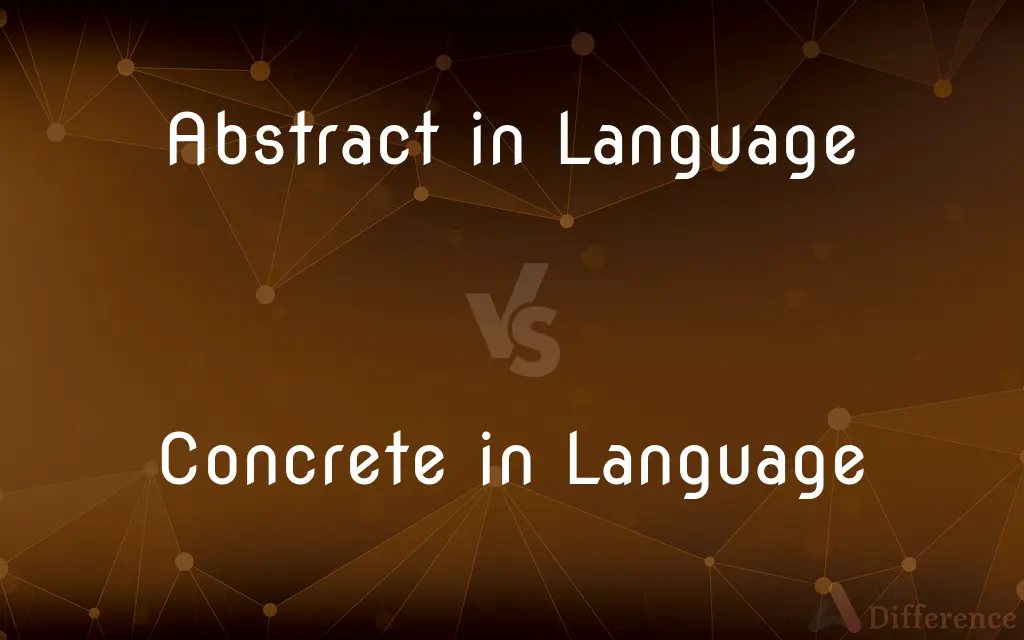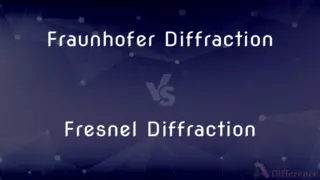Abstract in Language vs. Concrete in Language — What's the Difference?
Edited by Tayyaba Rehman — By Fiza Rafique — Published on November 17, 2023
In language, "abstract" refers to words or concepts that are intangible and cannot be experienced directly, while "concrete" denotes words or ideas representing tangible items or experiences that can be perceived through the senses.

Difference Between Abstract in Language and Concrete in Language
Table of Contents
ADVERTISEMENT
Key Differences
When we explore the vast realm of language, the terms "abstract" and "concrete" provide clarity to our expressions. Abstract in language pertains to words or concepts that signify ideas, emotions, or conditions that are not directly perceivable. For instance, the notion of "love" or "freedom" falls under this category. These concepts, although deeply rooted in human understanding, lack a physical representation. On the flip side, concrete in language involves words or concepts that depict tangible entities or events. A "tree" or the sound of "thunder" are concrete because they can be directly seen, heard, or touched.
Diving deeper, abstract in language often challenges the listener or reader, urging them to contemplate and interpret its meaning based on personal experiences or beliefs. It's this abstraction that makes poetry, philosophy, and some literary genres profound and open-ended. Concrete in language, in contrast, offers clarity and specificity. It grounds the listener or reader in a shared reality, making descriptions vivid and relatable.
Furthermore, the abstract in language can be perceived as subjective, as its interpretation varies among individuals. The notion of "justice" might evoke different images or feelings for different people. Concrete in language, however, remains consistent in its representation. The word "apple" invariably brings to mind the fruit, regardless of the listener's personal experiences.
To put it succinctly, while abstract in language deals with the nebulous and intangible, giving depth to discussions and contemplations, concrete in language remains rooted in the observable world, providing clarity and a shared understanding.
Comparison Chart
Definition
Pertains to intangible concepts or ideas.
Relates to tangible entities or experiences.
ADVERTISEMENT
Perception
Cannot be directly perceived through the senses.
Directly perceivable through one or more senses.
Subjectivity
Open to personal interpretation.
Remains consistent in representation across individuals.
Use in Language
Adds depth and open-endedness to discussions.
Provides clarity and a shared understanding.
Examples
Love, freedom, justice.
Apple, thunder, tree.
Compare with Definitions
Abstract in Language
Concepts open to personal interpretation and understanding.
Justice is an abstract concept that varies among cultures.
Concrete in Language
Terms that offer specific and clear descriptions.
Describing a red apple with a green leaf is using concrete language.
Abstract in Language
Words or concepts representing intangible ideas or emotions.
The term bravery is an example of an abstract in language.
Concrete in Language
Words or concepts signifying tangible items or experiences.
The word cat is concrete in language as it represents a specific animal.
Abstract in Language
Terms that cannot be experienced directly through the senses.
The emotion of envy is an abstract feeling, unseen but deeply felt.
Concrete in Language
Language elements that can be directly perceived through senses.
The aroma of freshly baked bread uses concrete language.
Abstract in Language
Elements of language that lack physical representation.
Terms like hope and belief demonstrate the abstract nature of language.
Concrete in Language
Words that ground the listener or reader in a shared reality.
Terms like loud thunder or cold ice are concrete and easily understandable.
Abstract in Language
Language components representing general ideas rather than specific instances.
The word happiness is abstract as it signifies a state of mind rather than a specific event.
Concrete in Language
Language components detailing specific instances or entities.
The phrase chirping of the sparrows is an example of concrete language.
Common Curiosities
Are concrete terms easier to understand?
Yes, concrete terms are more straightforward as they refer to specific, perceivable entities or experiences.
Why is abstract language important in poetry?
Abstract language adds depth, emotion, and open-endedness to poetry, allowing personal interpretation.
Can concrete language make writing more vivid?
Yes, concrete terms provide clear imagery, grounding the reader in a shared reality.
What is the primary difference between abstract and concrete in language?
Abstract pertains to intangible concepts, while concrete relates to tangible items or experiences.
Can a term be both abstract and concrete?
Generally, terms are either abstract or concrete, but context can sometimes blur the lines.
Can one sentence contain both abstract and concrete terms?
Absolutely, e.g., "The love (abstract) for her cat (concrete) was evident."
Are sensations like "cold" and "hot" concrete?
Yes, they refer to tangible experiences perceivable by touch.
Is abstract language subjective?
Yes, abstract concepts can vary in interpretation among individuals.
Would "sound of a bell" be considered concrete language?
Yes, because it refers to a specific, perceivable experience.
Why might a writer choose abstract language over concrete?
Abstract language can evoke deeper thought, emotion, and personal reflection.
Is "love" abstract or concrete?
"Love" is abstract as it represents an intangible emotion.
Does abstract language make things ambiguous?
It can, as abstract terms are open to interpretation.
In speeches, is it better to use abstract or concrete language?
Both have value; concrete language clarifies points, while abstract language evokes emotion and thought.
How can one differentiate between abstract and concrete terms?
Determine if the term refers to something tangible/perceivable or an intangible idea/emotion.
Are numbers abstract or concrete in language?
Numbers can be both; "five" is concrete, but "infinity" is abstract.
Share Your Discovery

Previous Comparison
Mammals vs. Amphibians
Next Comparison
Fraunhofer Diffraction vs. Fresnel DiffractionAuthor Spotlight
Written by
Fiza RafiqueFiza Rafique is a skilled content writer at AskDifference.com, where she meticulously refines and enhances written pieces. Drawing from her vast editorial expertise, Fiza ensures clarity, accuracy, and precision in every article. Passionate about language, she continually seeks to elevate the quality of content for readers worldwide.
Edited by
Tayyaba RehmanTayyaba Rehman is a distinguished writer, currently serving as a primary contributor to askdifference.com. As a researcher in semantics and etymology, Tayyaba's passion for the complexity of languages and their distinctions has found a perfect home on the platform. Tayyaba delves into the intricacies of language, distinguishing between commonly confused words and phrases, thereby providing clarity for readers worldwide.
















































